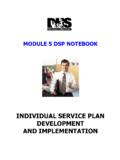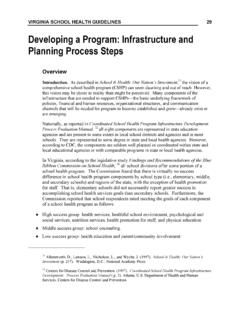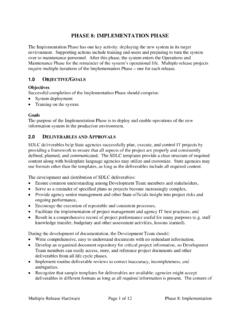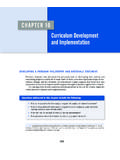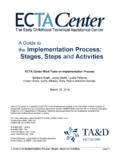Transcription of INDIVIDUAL SERVICE PLAN DEVELOPMENT AND IMPLEMENTATION
1 MODULE 5 DSP NOTEBOOK INDIVIDUAL SERVICE plan DEVELOPMENT AND IMPLEMENTATION Module 5 DSP Notebook INDIVIDUAL SERVICE plan DEVELOPMENT & IMPLEMENTATION 1 R-09-01-13 TABLE OF CONTENTS INTRODUCTION .. 2 WHAT IS THE INDIVIDUAL SERVICE plan (ISP)? .. 3 DESCRIPTION OF INDIVIDUAL SERVICE plan FOR ADULTS .. 4 ACTIVITY: .. 5 ISP SCAVENGER HUNT .. 6 WHAT IS THE IDT? .. 8 WHO MAKES UP THE INTERDISCIPLINARY TEAM? .. 9 FAMILY INVOLVEMENT .. 12 WHAT IS PERSON-CENTERED PLANNING? .. 13 QUIZ - WHAT IS PERSON-CENTERED PLANNING? .. 14 DEFINITIONS .. 15 NATURAL RHYTHM OF 16 COMMUNITY INCLUSION .. 17 THE ROLE OF THE DSP IN SUPPORTING COMMUNITY INCLUSION .. 18 RESOURCES AVAILABLE FOR VOCATIONAL OPPORTUNITIES .. 20 TEACHING FUNCTIONAL SKILLS .. 21 TIPS FOR TEACHING FUNCTIONAL SKILLS .. 22 STIMULATION ACTIVITIES COMPARED TO REAL ACTIVITIES .. 23 LEARNING 24 TASK ANALYSIS.
2 26 TECHNIQUES FOR TEACHING NEW SKILLS .. 29 DISCOVERING 31 PERSONAL REINFORCERS EXERCISE .. 32 DOCUMENTATION .. 33 DOCUMENTATION SCENARIO .. 38 A PENNY .. 39 MARTIN LUTHER KING SAID: .. 40 SECTIONS OF THE SERVICE plan .. 41 Module 5 DSP Notebook INDIVIDUAL SERVICE plan DEVELOPMENT & IMPLEMENTATION 2 R-09-01-13 INTRODUCTION "My name is April. This year I ran my own ISP meeting by myself. To get ready for the meeting I told my staff at my house what was important to me and they made a list for me. I told staff the most important things first. We talked about me moving to a new house. This was most important to me. I invited people to my meeting. I told my house manager that I wanted to have food at my meeting so he brought some. I was a little shy at first but then I told everyone what I wanted." Submitted by April, self-advocate from Chicago Heights, IL Module 5 DSP Notebook INDIVIDUAL SERVICE plan DEVELOPMENT & IMPLEMENTATION 3 R-09-01-13 What is the INDIVIDUAL SERVICE plan (ISP)?
3 The INDIVIDUAL SERVICE plan (ISP) is the written details of the supports, activities, and resources required for the INDIVIDUAL to achieve personal goals. The INDIVIDUAL SERVICE plan is developed to articulate decisions and agreements made during a person-centered process of planning and information gathering. The general welfare and personal preferences of the INDIVIDUAL are the key consideration in the DEVELOPMENT of all plans. The INDIVIDUAL and his/her team are responsible for developing the INDIVIDUAL plan of support. These teams, called interdisciplinary teams (IDT), are composed of people who care about and know the INDIVIDUAL . The team may also ask specialists, consultants, or specific provider staff to contribute to the plan by completing evaluations, or by observing and collecting information that is basic to the preparation of the plan . The IDT is ultimately responsible for assessing and documenting each person s: Personal choices and preferences.
4 Significant health care, mental health or behavioral needs and related maintenance needs. Safety and financial skills. The teams translate this information into goals and objectives, which are then contained within the written plan . The plan results in outcomes that maintain or change services or supports to reflect what is most important to and most important for the INDIVIDUAL in their daily life. SERVICE plans could be known as: IPPs' INDIVIDUAL _____ Plans ISPs' INDIVIDUAL _____ Plans IHPs' INDIVIDUAL _____ Plans IEPs' INDIVIDUAL _____ Plans These are probably the most common names for SERVICE plans. Module 5 DSP Notebook INDIVIDUAL SERVICE plan DEVELOPMENT & IMPLEMENTATION 4 R-09-01-13 Description of INDIVIDUAL SERVICE plan for Adults Although each agency has its own ISP format, there are some basic elements and information contained in almost all plans as listed in the Appendix of this Module.
5 Note: Because of their highly individualized nature, not all SERVICE plans contain all the components listed. Some plans may have additional information not listed in the Appendix. Life Goals INDIVIDUAL SERVICE Plans should reflect the goals of the INDIVIDUAL served. Because we are all different and unique people, each person s ISP should be unique and address the needs and desires of the person. To begin the process, we must first learn how a person wants to live. In your role as a DSP, you can continually encourage people to experience new things. This enables the person to exercise greater choice in life because they have the experience to do so. After we learn what a person wants, we can then decide what needs to be done to help the person move toward that life. Good plans are rooted in what is important to the person, while taking into account all the other factors that impact the person s life.
6 Life Changes Just as people change, SERVICE plans need to be revised to reflect growth, new interests and desires. SERVICE plans are reviewed a minimum of once per year at INDIVIDUAL SERVICE plan meetings. Sometimes these meetings are called annuals. More and more, agencies are getting away from that practice and holding meetings to discuss these plans on an as needed basis. In a year's time, much in your own life changes. This includes developing new interests and desires, changing where you live or work, who your friends are, etc. Module 5 DSP Notebook INDIVIDUAL SERVICE plan DEVELOPMENT & IMPLEMENTATION 5 R-09-01-13 Activity: On a separate piece of paper, list the changes that have taken place in your own life in the past year. Include interests, dreams, goals, relationships, births, deaths, etc. Then we will discuss how you would feel if you had to wait for an annual meeting to make adjustments to your plans.
7 _____ Module 5 DSP Notebook INDIVIDUAL SERVICE plan DEVELOPMENT & IMPLEMENTATION 6 R-09-01-13 ISP Scavenger Hunt Directions: Work with your assigned group to find the answer to as many of the following questions as possible. 1. Where is the following information found in the ISP? Use page number(s) to indicate the location(s). Note - it may be in more than one location. Assessment results Personal Preferences Background/Historical Personal Rights Communication Style Personal Values Education Personality Financial Recent Life Changes Goals Social Relationships Interests & Activities Strengths & Weaknesses Learning Style Vision for the Future/dreams Medical/Dental/Nutritional Vocation Personal Description 2. How does this person communicate? 3. List one of this INDIVIDUAL 's favorite activities. 4. List one of this INDIVIDUAL 's goals.
8 5. How will this goal be achieved? 6. When is this goal to be met? 7. What responsibility do you as a DSP have in supporting the INDIVIDUAL in achieving this goal? 8. Does this person have a behavior management (intervention) plan ? If so, what is Module 5 DSP Notebook INDIVIDUAL SERVICE plan DEVELOPMENT & IMPLEMENTATION 7 R-09-01-13 your role in implementing it? 9. What is this INDIVIDUAL 's current medical condition? What can you do to support his/her health? 10. Name a recent life change. 11. List five things below that you would like to know more about in order to provide support to this INDIVIDUAL : 1. 2. 3. 4. 5. What Makes A Good SERVICE plan ? How do you know that the ISP you just reviewed is an accurate reflection of the person? Things to check for: C It was unique to this INDIVIDUAL C Focused on abilities C Showed the person s choices and preferences C Was respectful C People significant to the INDIVIDUAL were involved C Identified social connection C Maintained confidentiality C Hopes/Dreams/Goals are a priority to the INDIVIDUAL C Hopes/Dreams/Goals are realistic C Hopes/Dreams/Goals are precise & measurable C Hopes/Dreams/Goals state how they are to be met The plan should include a personalized statement of the person s expectations for the future and state who will be responsible for providing the supports and services to reach those goals.
9 Additionally, the plan should address natural supports and connections for people with other citizens of the community. Module 5 DSP Notebook INDIVIDUAL SERVICE plan DEVELOPMENT & IMPLEMENTATION 8 R-09-01-13 What is the IDT? The Interdisciplinary Team (IDT) consists of at least the person, parents (except when the person or the person s guardian does not desire them to participate), the guardian, as well as representatives of disciplines and services necessary to identify the person's needs and to design services and alternatives to meet them. At least one member of the team must be a Qualified Intellectual Disabilities Professional (QIDP). The IDT process assesses the strengths and needs of persons with mental disabilities with input from the person requesting and/or receiving services and from those providing services . The IDT works to develop and implement the person s SERVICE plan .
10 Module 5 DSP Notebook INDIVIDUAL SERVICE plan DEVELOPMENT & IMPLEMENTATION 9 R-09-01-13 Who Makes Up the Interdisciplinary Team? A number of people are involved in developing the ISP. The most important member of the team is the person being served and there should never be a meeting without the person. Its primary purpose is to assist the INDIVIDUAL with developmental disabilities in making decisions about life goals. Members: The person supported and the team of professionals, who usually include the following: C QIDP C Psychologist/Psychiatrist C Social Worker C Doctor/Nurse C DSP C Nutritionist C OT/PT C Teacher C Residential Representative C Day Program Representative C Vocational Rep/Job Coach Non-Professionals C Friends C Family C Guardians C Co-Workers Note: It is usually the DSP who works most closely with the person being supported. Your role is vital to the team.

